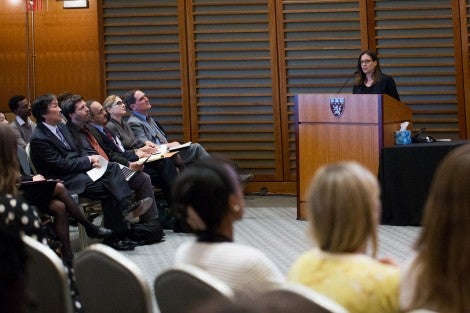April 8, 2016—From smoking to the ravages of war, adolescents in developing countries face numerous threats to their health. Experts discussed these threats—and possible policy responses—at the third annual State of Global Health Symposium, hosted on March 29, 2016 by the Department of Global Health and Population at Harvard T.H. Chan School of Public Health.
Theresa Betancourt, associate professor of global health and population, highlighted the importance of mental health for adolescents, particularly in war-torn areas. According to Betancourt, an estimated 230 million children live in areas affected by armed conflict, and 75% of mental health problems begin before age 24—meaning that the traumatic stress of war can have lingering, lifelong consequences for young people.
Adolescents who experience certain types of toxic stress—“young people who survived rape, [young people] who were involved in injuring or killing other people, or [young people] who experienced the death of a caregiver”— are at a higher risk for mental health problems such as depression or anxiety, said Betancourt.
A person’s recovery largely depends on what happens after the conflict, said Betancourt. Are they accepted back into their community, with the chance to attend school? Or are they stigmatized and denied food and shelter?
Betancourt has tested post-conflict interventions for young people in Sierra Leone, which was ravaged by an 11-year civil war from 1991 to 2002. In a recently completed study that assessed the impact of group cognitive-behavioral therapy for war-affected youth ages 15–24, Betancourt found that those who completed the therapy were not only better able to manage anger and stress, but they were also more likely to attend school and perform better in their classes.
Betancourt says the real challenge now is finding a way to scale up interventions like this across the country.
One billion tobacco deaths

Howard Koh, Harvey V. Fineberg Professor of the Practice of Public Health Leadership, outlined how smoking will disproportionately affect low- and middle-income countries in the coming decades. In the 20th century, tobacco was linked to 100 million deaths—90% of which occurred in high-income countries. In the 21st century, it’s projected that there will be one billion tobacco-related deaths, with 70% occurring in low- and middle-income countries.
According to the World Health Organization (WHO), 80,000–100,000 children worldwide start smoking every day, and nearly half of those who start smoking in their adolescent years will go on to smoke for 15 to 20 years.
“We want to see more policy actions, we want to see more action to prevent [smoking] initiation in the first place, and we want to change the social norm so people appreciate that we don’t need this level of drug dependence in our kids,” said Koh.
Koh told the audience that there has been progress, including the WHO’s Framework Convention on Tobacco Control, which was adopted in 2003 and has now been ratified by 180 countries. Under the Convention, those countries have agreed to take tobacco control measures ranging from limits on advertising to indoor smoking bans.
Other Harvard Chan researchers who presented at the event included Jennifer Leaning, François-Xavier Bagnoud Professor of the Practice of Health and Human Rights, Jocelyn Finlay, research scientist at the Harvard Center for Population and Development Studies, Phuong Pham, assistant professor in the Department of Global Health and Population, and Nir Eyal, associate professor of global health and population. The Symposium also included remarks on maternal, newborn, and child health by David Ross of the World Health Organization (WHO).
Photo: Sarah Sholes
